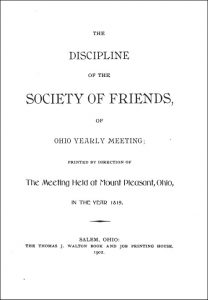For much of the nineteenth century, one item of business that was regularly addressed during our monthly meetings was responding to a number of queries contained in the Discipline (the guide to Quaker living that we now call Faith and Practice). In addition to reporting on the state of the Society to the yearly meeting, the purpose of the queries was “to impress on the minds of our members a profitable individual examination of themselves, how far they act consistently with their religious profession.”
 In the early 1800s, nine queries were part of the Discipline. All monthly meetings were expected to provide responses to all of them once a year, as well as answering the first, second, and ninth queries for each of the two quarters preceding the yearly meeting.
In the early 1800s, nine queries were part of the Discipline. All monthly meetings were expected to provide responses to all of them once a year, as well as answering the first, second, and ninth queries for each of the two quarters preceding the yearly meeting.
- Are all Meetings for Worship and Discipline attended? Do Friends avoid unbecoming behavior therein? And is the hour of meeting observed?
- Do Friends maintain love towards each other, as becomes our Christian profession? Are tale-bearing and detraction discouraged? And when differences arise, are endeavours used speedily to end them?
- Do Friends endeavour, by example and precept, to educate their children, and those under their care, in plainness of speech, deportment and apparel? Do they guard them against reading pernicious books; and from the corrupt conversation of the world? And are they encouraged frequently to read the holy scriptures?
- Are Friends clear of importing, vending, distilling, or the unnecessary use of spirituous liquors; of frequenting taverns, or attending places of diversion? And do they observe moderation and temperance on all occasions?
- Are the necessities of the poor, and the circumstances of those who may appear likely to require aid, inspected and relieved? Are they advised, and assisted, in such employments as they are capable of; and is due care taken to promote the school-education of their children?
- Do Friends maintain a faithful testimony against a hireling ministry, oaths, military services, clandestine trade, prize-goods and lotteries?
- Are Friends careful to live within the bounds of their circumstances, and to avoid involving themselves in business beyond their ability to manage? Are they just in their dealings, and punctual in complying with their engagements? And where any give reasonable grounds for fear in these respects, is due care extended to them?
- Are Friends careful to bear a testimony against slavery? Do they provide, in a suitable manner, for those under their direction, who have had their freedom secured; and are they instructed in useful learning?
- Is care taken to deal with offenders seasonably and impartially, and to endeavour to evince to those who will not be reclaimed, the spirit of meekness and love, before judgment is placed upon them?
The responses to the queries were fairly routine: “Meetings for worship are attended by most Friends” was the standard response to the first query, although it was occasionally noted that attendance at Thursday worship was “sometimes over small.” In fact, by 1820, a committee was formed to discuss how to encourage attendance at both the weekday meeting for worship and monthly meetings for discipline (which we now call Monthly Meeting for Worship with Attention to Business).
“We believe most Friends maintain a good degree of love toward each other” was the standard response to the second query. And although it was no doubt true during the meeting’s formative period, nothing would so sorely test those bonds of love as the events of the next few years.
This article comes from the book Friends Past and Present: The Bicentennial History of Cincinnati Friends Meeting (1815–2015). You can obtain a copy of the printed book or a Kindle version from Amazon.com. The proceeds of all sales go to Cincinnati Friends Meeting.

What constitutes “unnecessary use of spirituous liquors”?
I believe “spirituous liquors” refers to what we would call “hard liquor”–rum, whiskey, etc. This seems to be supported by the reference to “distilling” (as opposed to fermentation, which is used to produce wine or beer). However, some Quaker scholars assert that Friends opposed imbibing any beverage with the potential to intoxicate.
“Unnecessary use” refers to recreational use as opposed to medicinal use. For example, in the absence of anesthesia, Friends would allow for a shot of alcohol to blunt the pain of a surgical procedure. They also acknowledged that the occasional small drink of whiskey had potential health benefits for heart conditions. (WebMD concurs.)
One of our nineteenth-century Quaker ministers, Murray Shipley, had a heart condition, and did periodically drink whiskey to treat it. Once, his wife was out buying a couple of bottles for him, but fearing that onlookers would cast aspersions at this Quaker woman buying spiritous liquors, she hid the bottles under her cloak. Unfortunately, while she was walking home, a solicitous police officer took her arm to help her cross the street, causing her to lose her grip on the bottles and sending them crashing on the ground. So much for discretion!
On the question of spirituous liquors, when my father was a Methodist minister serving a rural church in Southeastern Pennsylvania, he and my mother invited two Quaker ladies who lived nearby to dinner. They were very complimentary about the food, but seemed especially appreciative of the dessert. “Oh yes,” my mother said, “the brandied peaches.” There was a stunned silence and some murmuring about “We don’t usually partake….” But then one of them said, “But they were good, though!”
Love that story!